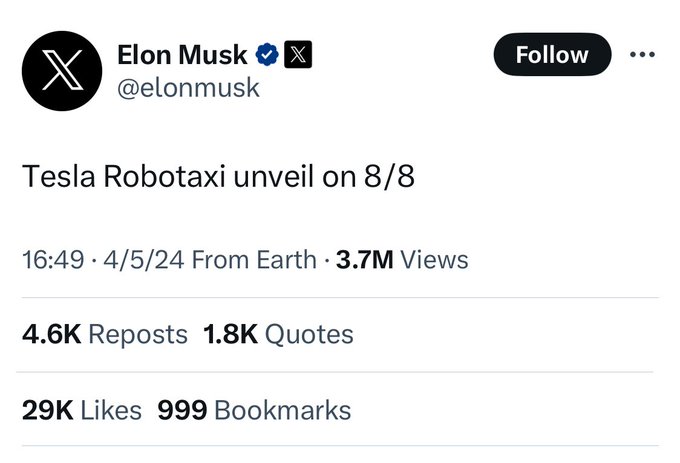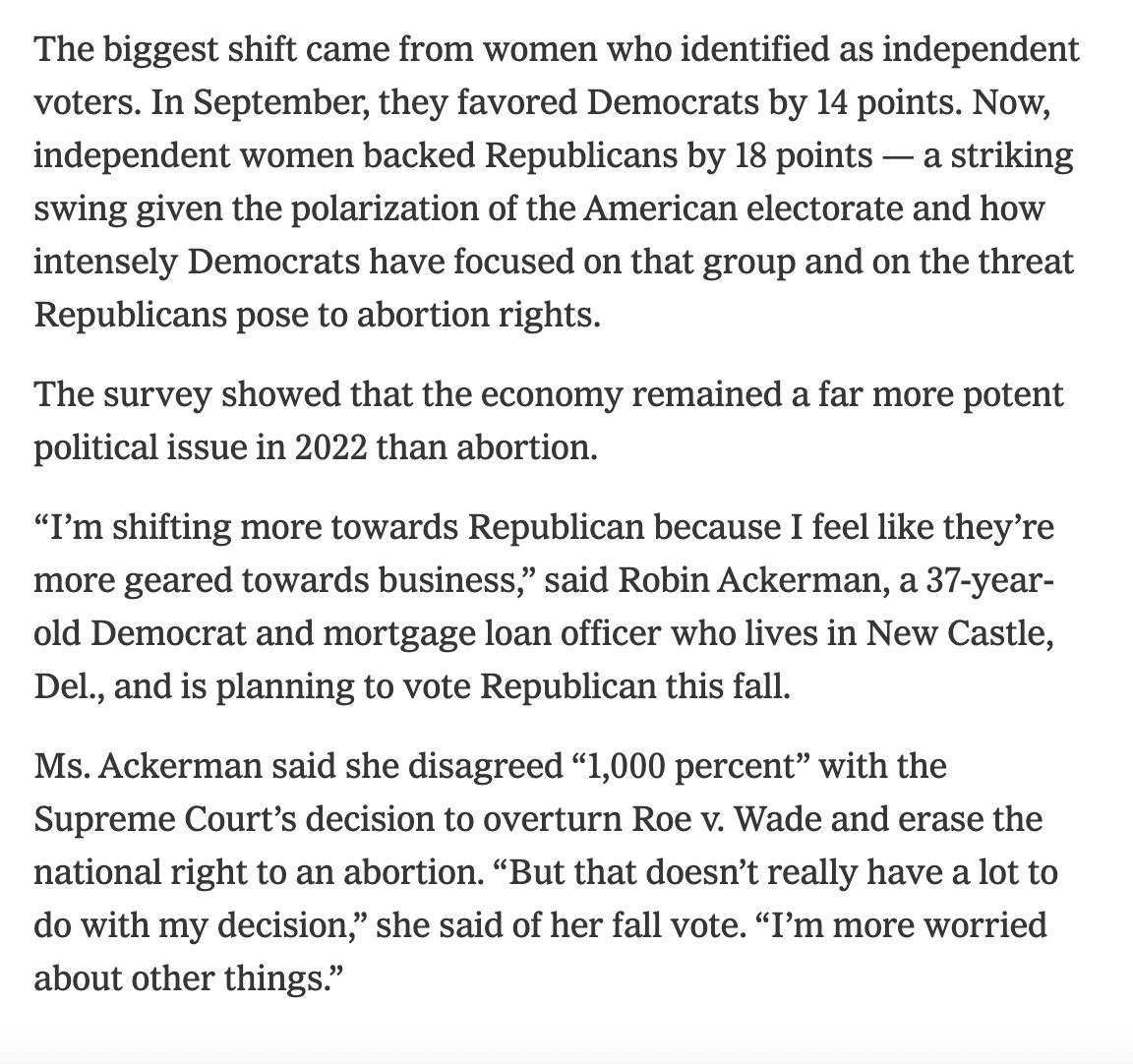It did not go well.
Hey Elon, Can I have my designs back please? #ElonMusk #Elon_Musk pic.twitter.com/WPgxHevr6E
— Alex Proyas (@alex_proyas) October 13, 2024
(On a related note, Dark City was better than the Matrix, but we'll get beck to that.)
Jonathan M. Gitlin writing for Ars Technica [emphasis added, but the caption was his.]:
Over time, Musk claimed the operating costs of his Cybercab would be 20 cents per mile, "and yes you'll be able to buy one," he told the crowd to excited shrieks. "We expect the cost to be below $30,000," Musk said, before expounding on a business model where instead of the company owning and operating these allegedly revenue-generating assets itself, they are instead owned by private individuals who each give Tesla its regular cut. This week another four top executives left the company in advance of last night's event, including "the global vehicle automation and safety policy lead."...
Musk claims that Tesla "expects to start" fully unsupervised FSD next year on public roads in California and Texas. A recent analysis by an independent testing firm found the current build requires human intervention about once every 13 miles, often on roads it has used before.
...
"Before 2027" should see the Cybercab, which Musk claims will be built in "very high volume." Tesla-watchers will no doubt remember similar claims about the Model X, Model 3, Model Y, and most recently the Cybertruck, all of which faced lengthy delays as the car maker struggled to build them at scale. Later, Musk treated the audience to a video of an articulated robotic arm with a vacuum cleaner attachment cleaning the two-seat interior of the Cybercab. Whether this will be sold as an aftermarket accessory to Cybercab owners, or if they're supposed to clean out their robotaxis by hand between trips, remains unclear at this time.
...
"Reading Wall Street analyst reactions to the 'We, Robot' event, the consensus that the event was 'underwhelming' says more about their expectations than the event itself," said Ed Niedermeyer, author of Ludicrous: The Unvarnished Story of Tesla Motors. "You can tell it's unsettling for them watching the fantasy float free of even appearing plausible or real. The fantasy of self-driving Teslas has worked for almost a decade because it felt real, but now just feels like a fantasy. Real things do not happen on movie studio lots. This was a theme park, not an informational event about an emerging technology," Niedermeyer told Ars.
Those who have paid attention to the details—the years of production hell that accompanied each of Tesla's five models, the repeated claims for a "coast to coast" Autopilot drive that haven't materialized in eight years, the regular federal safety investigations and resulting recalls for both Autopilot and FSD (which still can't drive itself in a one-way tunnel), and so on, there is nothing to suggest this latest chapter—couched cleverly under a "forward-looking statement" disclaimer—will be any different from the ones we've already read.
The Verge is also skeptical.
As good as the Ars Technica write-up was, it left out my favorite detail. Fortunately, we still have Jalopnik.
Tesla's Beer-Serving Optimus Robot Was Controlled By A Human The Whole Time https://t.co/IkpbwNbkMF pic.twitter.com/GAqTQy11GX
— Jalopnik (@Jalopnik) October 11, 2024
We predicted that this would either be a non-demonstration or a fake, possibly involving a mechanical Turk. My question is: does the bartender count?
Monday, April 8, 2024
If I had a slightly cynical attitude toward Elon Musk, I might be a bit suspicious of a couple of things here
First of all, there's the timing of this.
The
surprise Robo Taxi announcement certainly came at a fortuitous moment
for Musk. Before the news broke, Tesla was having a really bad, awful,
totally nogood year ...
... followed by a really bad, awful, totally nogood day thanks to the release of a Reuters story about the company ever so quietly canceling its plans for a low-cost EV. This was on top of tons of bad news about the companies inventory and other problems, not to mention the cybertruck managing to edge out the Ford Edsel as the ultimate cautionary tale of why not to overhype a new automobile.
At 4:49 in the afternoon, less than an hour after the stock dropped another 3.63%...
And one minute later...
Longtime
readers will be familiar with Musk's history of announcing incredible
breakthroughs, often just as one of his companies is about to go over a
cliff.
From May 25, 2022
About seven or eight years ago, Musk's promises started becoming unmoored not just from what his engineers were working on, but from what was even possible. As best I can tell, this started with the hyperloop.
[And before the rumbling starts again, though you have heard about hundreds of millions of dollars going into hyperloop companies, absolutely none of that money is going into Elon Musk s air cushion idea. Every proposal and protype you've seen has been for maglev. Companies like Virgin scrapped his concept but kept the name.]*
Part of the reason for these increasingly delusional boasts may just have been Musk getting high on his own supply.** Take someone with messianic tendencies, give them a full-bore cult of personality, and have even the most respectable journalists refer to him as a real life Tony Stark. You know it's going to go to a guy's head.
But these fantastic claims also served his financial interest. The huge run up in the stock of Tesla came after the narrative had shifted to over-the-top fantasy.
Maintaining his current fortune requires Musk to keep these fantasies vivid in the minds of fans and investors. People have to believe that the Tesla model after next will be a flying exoskeleton that can blow shit up.
To
be blunt, the industry is nowhere near the level of self-driving
functionality and Tesla in nowhere near being the leader in this field.
Assuming we do not witness the company leapfrog the competition and
unveil a major breakthrough in level 4 autonomy, what are we likely to
see on August 8th?
1. Nothing. Elon Musk will announce that the big reveal has been pushed back to make the product even more spectacular.
2.
An Optimus Style non demonstration where Elon will haul out a barely
functional prototype years behind the competition in terms of
sophistication and will spend the rest of the time talking about how
incredible the next iteration will eventually be.
3. Low level
fake. A painstakingly choreographed drive-through of carefully mapped
course with selective editing to cover the remaining glitches. (see
Optimus.)
4. High level fake. Everything in the low level fake
plus a Mechanical Turk actually at the controls. Check out the right
side of this video which was released to great fanfare.
Musk
later added a note that the robot was not actually operating
autonomously but of course, he wasn't trying to mislead anyone.
* In the two years since this post, those hundreds of millions have been long been burned through with the biggest and best financed Hyperloop One/Virgin Hyperloop finally shuttering its airlock last year.
** And we now know getting high on a lot of other things as well.












